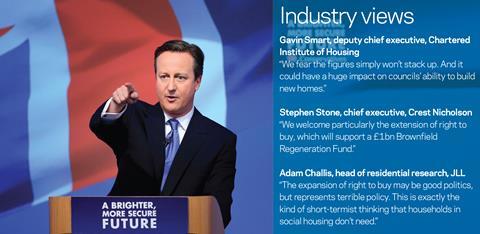Housing experts among those raising concerns that Tory manifesto pledge ŌĆśwonŌĆÖt stack upŌĆÖ for sector

Housing experts have slammed the Conservative PartyŌĆÖs proposed extension of the right to buy to housing association tenants, saying it could spark a lengthy legal battle and reduce the sectorŌĆÖs ability to build more homes.
Experts said the move, if imposed, could limit housing associationsŌĆÖ ability to access lending with which to fund new development, because loans are generally secured against their existing housing stock.
Launching the Conservative Party manifesto this week prime minister David Cameron said the extension of right to buy would see the fulfilment by the Tories of the ŌĆ£dream of a property-owning democracy.ŌĆØ
Housing associations own 1.3 million homes, and the extension of the right to buy would see tenants offered discounts of up to 35% to buy the homes. A briefing by the Conservatives said the discounts would be paid for by councils selling other high-value homes, although it was not clear how this money would be transferred to housing associations.
Richard Jones, head of regeneration at EC Harris, said the plan would damage registered providersŌĆÖ (RP) ability to raise money for housebuilding by reducing their asset base, and could even see some associations default on existing loans. ŌĆ£RPs may well say they would rather stop developing altogether than deal with this, with funders increasing interest on loans. It could be the straw that breaks the camelŌĆÖs back.ŌĆØ
Writing on ║├╔½Ž╚╔·TV.co.uk, Rachel Fisher, head of policy at the National Housing Federation, said: ŌĆ£Housing associations ŌĆ” invest ┬Ż6 for every ┬Ż1 that the government invests in affordable housing. This investment would be seriously undermined by the extension of right to buy as lenders may be less willing to provide such good rates to housing associations if there is a significant threat to those assets.ŌĆØ
In addition associations, many of which are constituted as charities and are classified as private bodies, are likely to argue that the government has no power without further legislation to force them to offer homes for sale.
Writing on ║├╔½Ž╚╔·TV.co.uk, consultant and former Housing Corporation chief executive Steve Douglas said: ŌĆ£The strong response from the housing association sector so far suggests that should a future government try to implement the policy, it will be fought out in the courts. This is the most significant test of whether an association is state controlled or independent that we have seen in a generation.ŌĆØ
Douglas and Jones added that if the government won a legal fight to force associations to sell homes, a side effect may be to make the government recognise the ┬Ż60bn currently borrowed by housing associations as part of the public sector debt.
The Conservative Party said stock bought by tenants would be replaced with new affordable housing on a one-for-one basis and that overall the policy would add to homes. However, so far fewer than half of council homes sold under right to buy have been replaced, despite a commitment to do so.
ELECTION MANIFESTOS: Key construction pledges
- The Conservatives have committed to spending ┬Ż100bn on infrastructure over the course of the next parliament and promised to increase capital spending in line with national income. The manifesto launched a ┬Ż1bn Brownfield Fund to unlock sites for new housing.
- Labour promised to limit the cost of HS2 and backed expanding rail links in the North of England. The party has also committed to implementing the Lyons Review recommendations and to the setup of an independent National Infrastructure Commission.
- The Liberal Democrats said they would set a goal to build 300,000 homes a year, including 10 new garden cities where homes are most needed.
- The Green Party would end PFI contracts in the NHS and restore capital funding in education to 2010 levels in real terms. In transport, the Greens would scrap HS2.
- UKIP promised to scrap HS2 and make homes on brownfield sites exempt from Stamp Duty.



























No comments yet